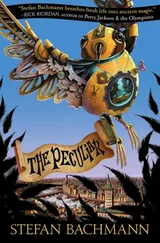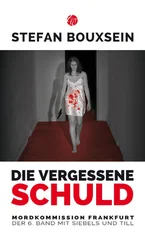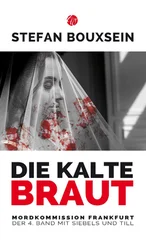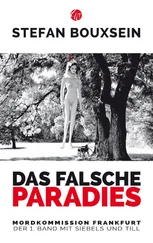“Terribly sorry, my lady, but you will have to find me later. Someone is in need of my assistance now, and”—Mr. Jelliby broke free of Maribeth Skimpshaw’s clutches—“and I really must be going. ” He set off again toward the young soldier, trailing rose scent in ribbons behind him.
The orchestra was in full tilt now, sweeping everyone up in a glorious, whirling waltz. Mr. Jelliby could hardly see the soldier anymore. Only snatches of him, in between the spinning figures and bright gowns. His face was chalky. Drained, almost.
“Lord Jelliby? Oh, Arthur Jelliby!” someone called from across the room.
Mr. Jelliby walked faster.
And then, all at once, a rustle passed through the crowd, a disturbance, like the wind in the treetops before a storm. It started on the dancing floor and spread out until it had reached the farthest corners of the ballroom. The rustle swelled. Shouts, then a shriek, and then people were peeling away from Mr. Jelliby, backing up against the walls.
Mr. Jelliby stopped in his tracks.
The young soldier stood directly in front of him, not five paces away. He was alone, all alone on the polished floorboards. His hand was raised, stretched out in front of him. In it was clutched a bloody rag.
Mr. Jelliby let out a little cough.
The rag was blue, the color of England, the color of her army. Shreds of a red sash still clung to it. A spattered medal. The young soldier’s mouth opened, but no sound came out. He simply stared at the rag in his hand, a look of mild surprise on his white, white face.
The ballroom had gone deathly still. No one spoke. No one moved. The clockwork maids had all creaked to a halt. The old ladies were staring so hard their eyes seemed about to pop from their heads. Lady Halifax lay sprawled over a fainting couch, face red as an apple.
Mr. Jelliby’s first thought was, Good heavens, he’s killed someone, but he couldn’t see anyone hurt. No one seemed to be missing a piece of his uniform, nor were there any wounds visible among the swaths of lace and satin.
“Young man,” Mr. Jelliby started to say, unsteadily, taking a step toward the soldier. “Young man, what in—”
But he didn’t have time to say anything else, because suddenly the soldier began to change. As Mr. Jelliby watched, blood came up between the soldier’s teeth and gushed down his chin in a crimson sheet. Bright holes tore themselves through the fabric of his uniform. He spasmed, once, twice, as if being hit by some great, invisible force.
And then he began to fall, so slowly. Petals of black pulled away from his coat, his arms, and the side of his face as he descended through the air. There was a sound like distant guns. And before he struck the floor, he seemed to disintegrate, turn to ash and smoke and black powder.
Then he was gone, and the ladies were screaming.
Mr. Jelliby heard glass breaking. The lights were so hot now, so raging hot. He couldn’t smell the tarts anymore. Only the fear, thick as river mud in the rippling air.
 IKEY Thomas dreamed of plums and caramel apples the night the faery-with-the-peeling-face stole his left eye.
IKEY Thomas dreamed of plums and caramel apples the night the faery-with-the-peeling-face stole his left eye.
It was a wonderful dream. He wasn’t in the bitter chill of his hole under the chemist’s shop anymore. The old wooden signboard with its painted hands and hawthorn leaves no longer creaked overhead, and the ice wasn’t crusting his face. In his sleep Pikey was warm, curled up by an iron stove, and the plums were drifting out of the dark, and he was eating a caramel apple that never seemed to get any smaller.
He always dreamed of caramel apples when he could help it. And iron stoves, too, in the winter. And plums and pies and loud, happy voices calling his name.
Tap-tap. Tap-tap. Far, far away on the other side of his eyelids, a figure entered the frozen alley.
Pikey bit down on his apple. He heard the footsteps, but he tried not to worry. Whoever it was would be gone soon. Folk were always stumbling into the chemist’s alley from Bell Lane, from the gutters and sluiceways and all the other fissures between the old houses of Spitalfields. None of them ever stayed for long.
Tap-tap. Tap-tap.
Pikey squirmed inside his blankets. Go away, he thought. Don’t wake me up. But the footsteps kept coming, limping slowly across the cobbles.
Tap-tap. Tap-tap. Pikey didn’t feel warm anymore. The plums still fell, but they stung now as they touched his skin, spitting, icy cold. He tried to take another bite of his apple. It turned to wind and cinders, and blew away.
Tap-tap. Tap-tap.
Snow was falling. Not plums. Snow. It gusted into his little hole, and suddenly Pikey’s nose was filled with the stench of old water and deep and mossy wells. A racket kicked up, old Rinshi straining against her chain, barking at something and then stopping, sharp-like. There was a grating, a scrape of metal.
Pikey saw the blood before he saw the figure, always the blood trickling toward him between the stones. Then the alley was filled with screams.
Pikey Thomas was running for his life.
It was a clear day, sharp and cold as a knife, but he couldn’t see a thing. The string that held the patch over his bad eye was slipping. The square of ancient leather slapped his face, disorienting him. He bounced off a drainpipe, did an ungainly whirl, kept running. Behind him, he heard the sound of a bell, coming after him, clanging furiously. Ahead was a gutter. He leaped into it and whistled over the frozen grime, sliding fast as anything. The gutter ended in a rusting grate. Pikey hurled himself over it, struck the cobbles running. His fingers went to the patch, trying desperately to tighten the string, but it wouldn’t stay, and he couldn’t stop. It was only about to get worse.
The cobble faery tripped him in Bluebottle Street.
There Pikey was, a knob of black bread clutched inside his jacket, pounding up a street that was as empty and icy as any in London. His pursuer was still two or three corners behind him. Pikey was sure he would get away. And then he felt the tremor in the ground beneath him, the rattle of the cobbles as a tiny faery raced through its secret tunnels. It popped up the stone just as Pikey’s foot was flying toward it.
Pikey let out a yelp and went careering into the wall of a house. His head knocked against stone. Pain shuddered through him, and he heard a wicked little voice sing, “Clumsy-patty, clumsy-patty, who’s a clumsy pitty-patty?”
Pikey spun, pushing himself away from the wall.
The faery was peeking out from under the lifted cobblestone, black-bead eyes glittering. It was a spryte, not three inches from head to toe. Bits of frosty branches grew behind its pointed ears and a dreadful grin was on its face, stretching halfway around. It was a very yellow grin, full of prickly little teeth.
“Shut up,” Pikey hissed. He ran at it, determined to smash it into a stringy mess. Too slow. The faery pulled down the cobble like a hat and was gone.
Pikey froze. He glanced back down the street, listening, making sure he still had some seconds to spare. Then he struck his boot heel against the ground three times, getting softer with each strike so that it would sound like he was walking away. The faery shot back up, still grinning. And Pikey leaped, straight onto the cobble. There was a squeak. The cobble smashed back into place. The faery’s hand twitched where it was pinched in.
“Serves you right, too,” Pikey said, but he had no time to enjoy his little victory. The bell was close now, echoing up between the buildings. An instant later, a huge officer in blue and crimson skidded into the street. A leadface.
Читать дальше
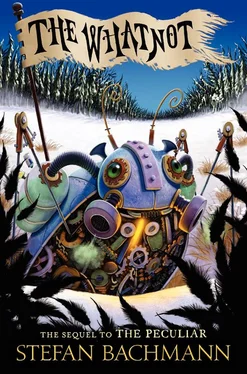
 IKEY Thomas dreamed of plums and caramel apples the night the faery-with-the-peeling-face stole his left eye.
IKEY Thomas dreamed of plums and caramel apples the night the faery-with-the-peeling-face stole his left eye.

